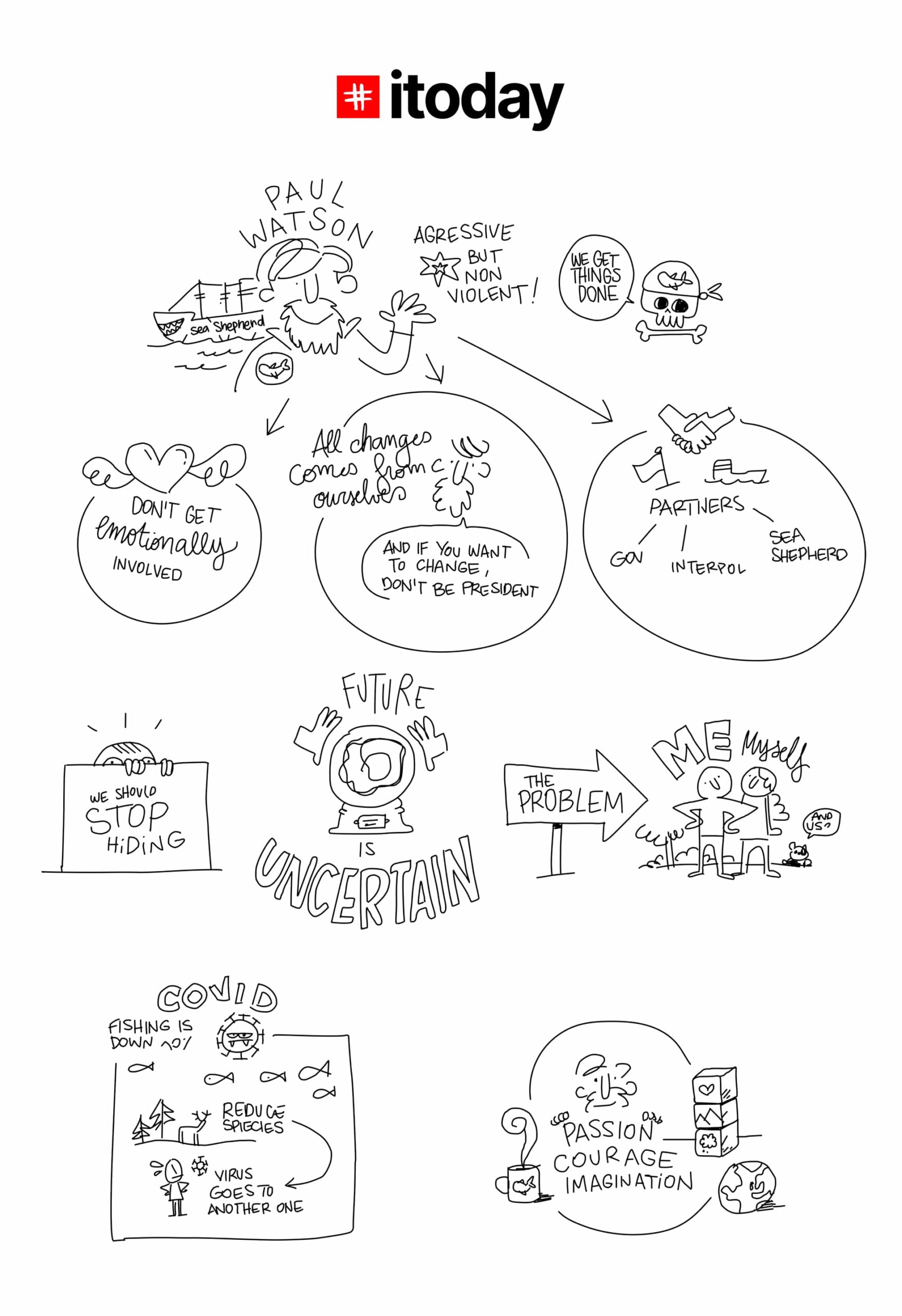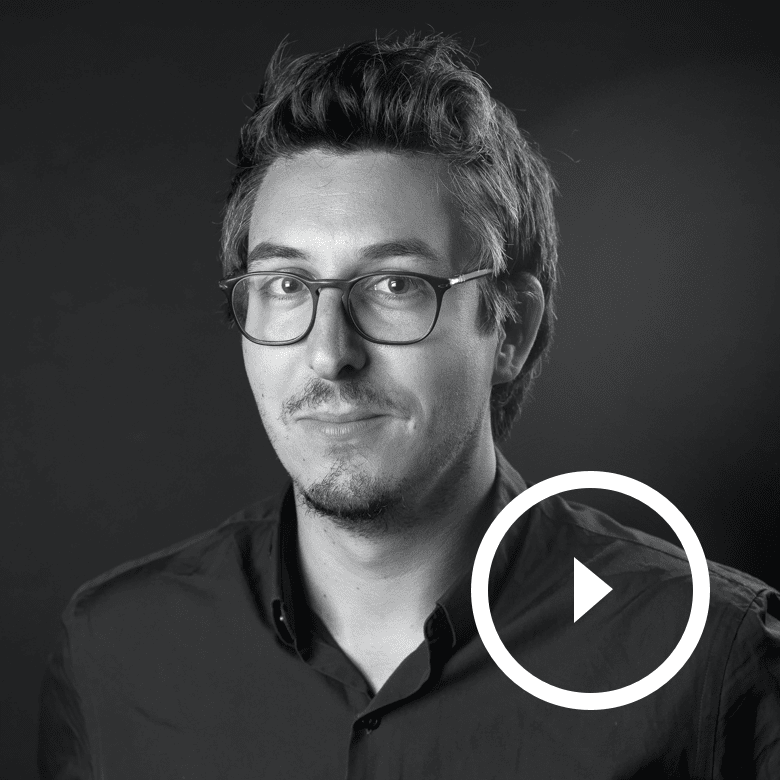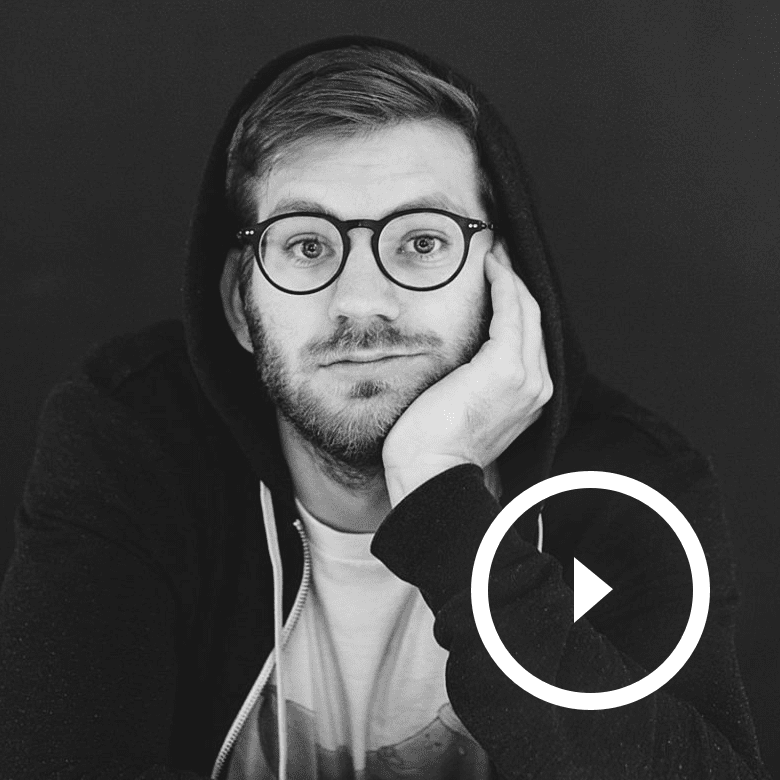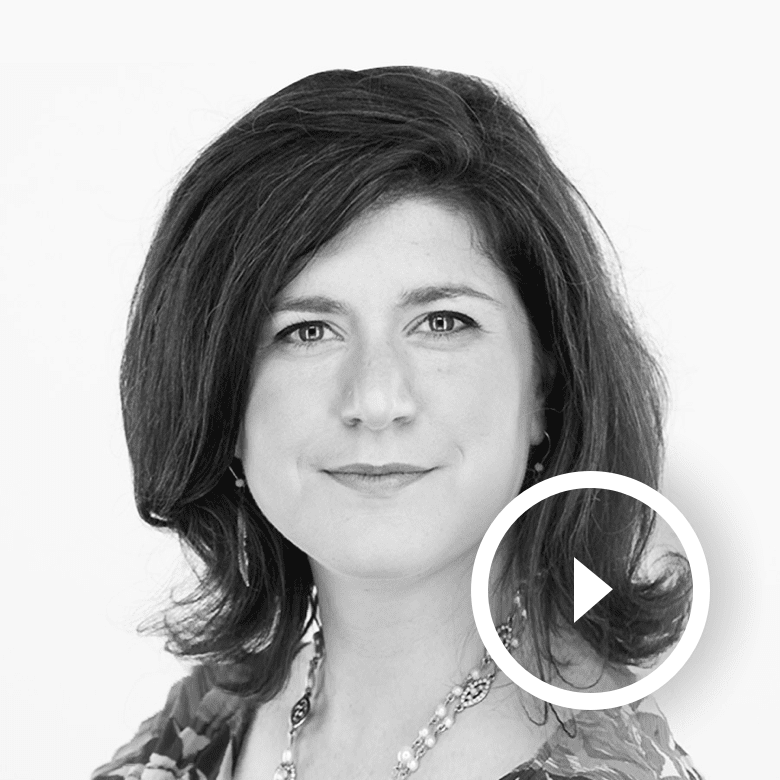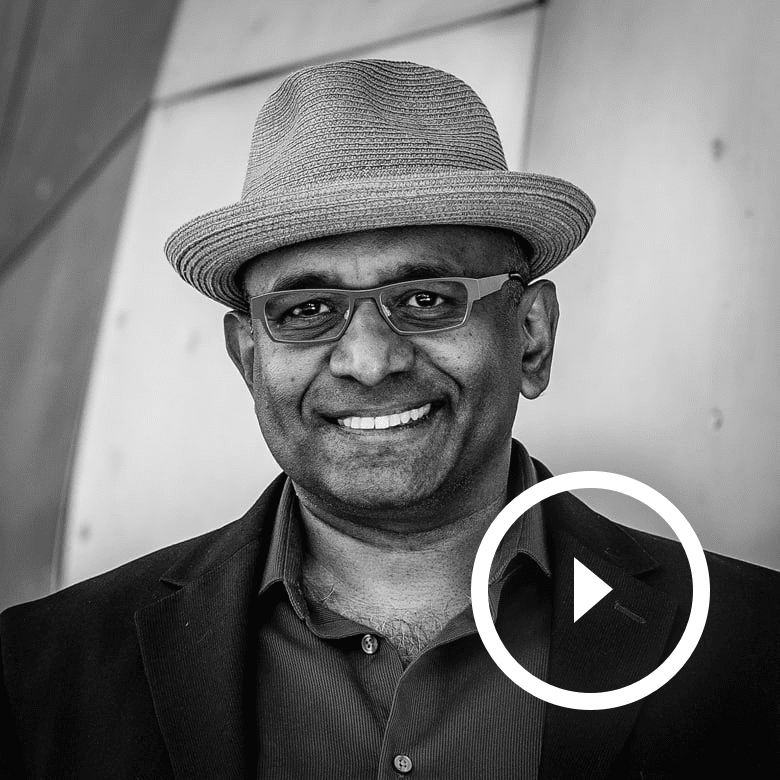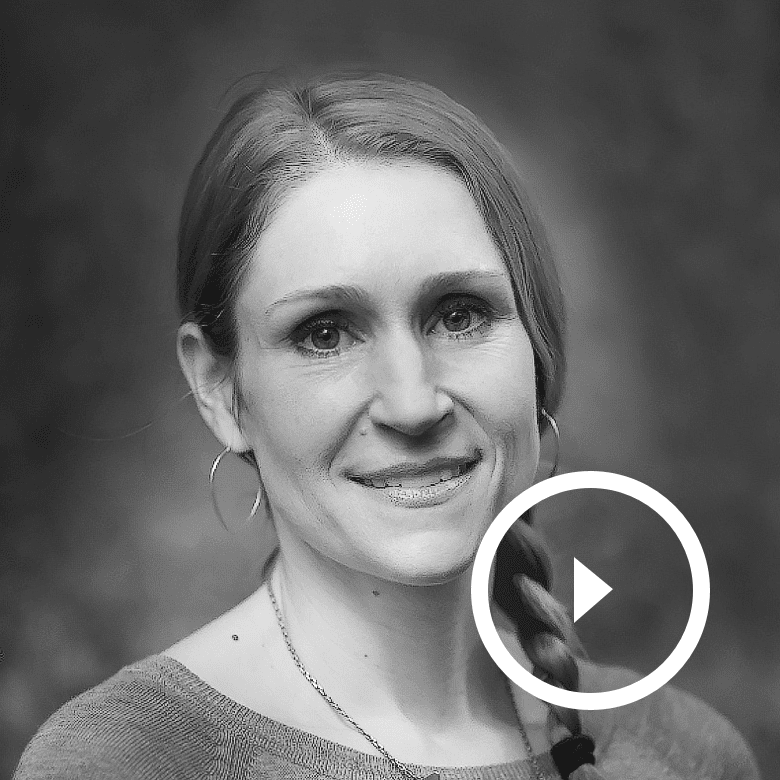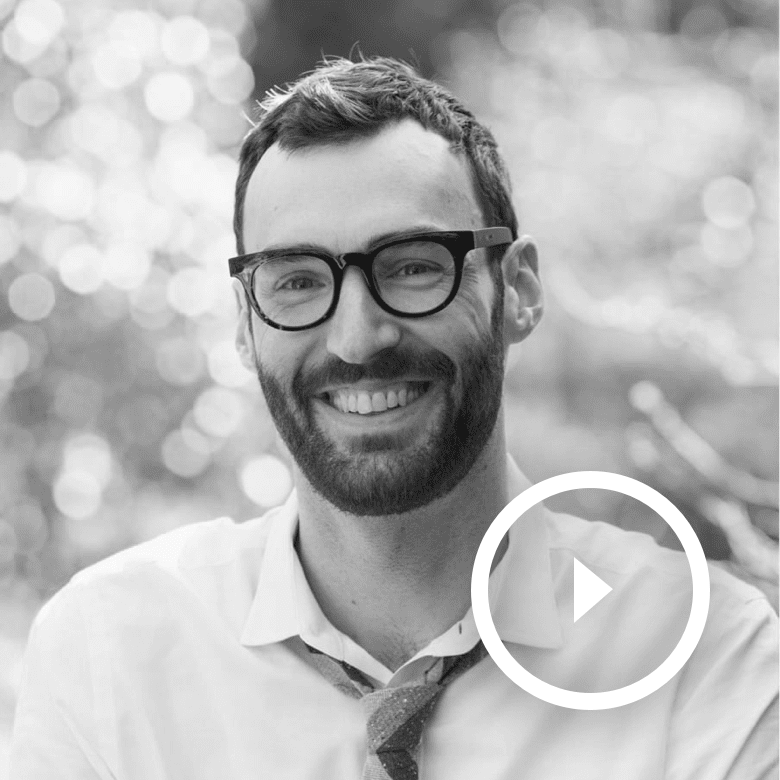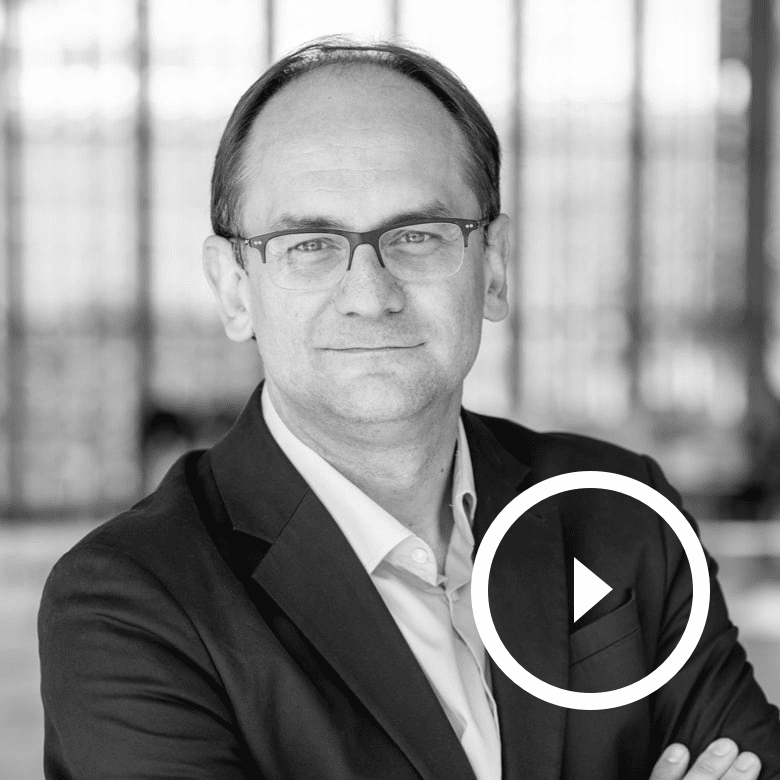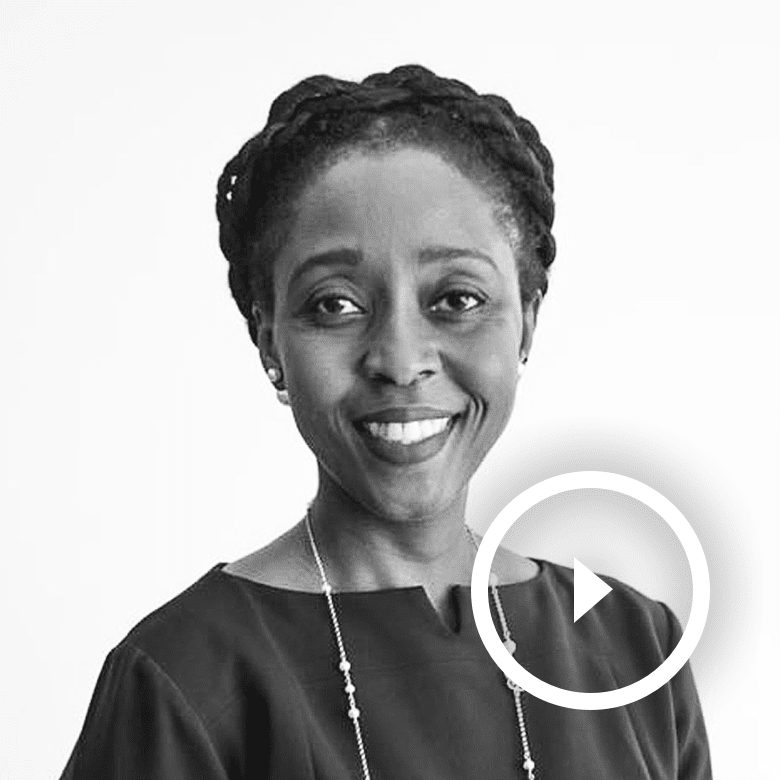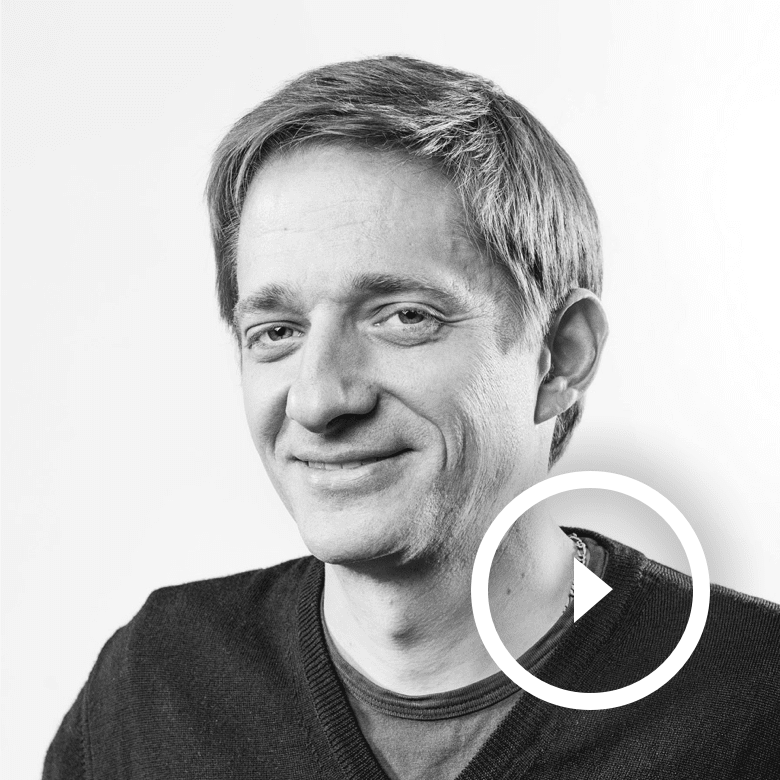Captain Paul Watson
Eco-Activist & Founder of Sea Shepherd Conservation Society
Why the economy needs a healthy ecology
Founder of the Sea Shepherd Conservation Society (CAN)
Captain Watson is a marine wildlife conservation and environmental activist from Toronto, Canada. He was one of the founding members and directors of Greenpeace.
In 1977, Captain Watson left Greenpeace and founded the Sea Shepherd Conservation Society. He has served as Master and Commander on seven different Sea Shepherd ships since 1978 and continues to lead Sea Shepherd campaigns for Sea Shepherd USA (SSCS).
Alongside his crew he has starred in seven seasons of Animal Planet’s television series Whale Wars. Captain Watson has received many awards and commendations over the years. In 1996, he was awarded an honorary citizenship to the French town of St. Jean Cap Ferrat.
Previous to that he was made an honorary citizen of the Florida Keys in 1989. Other awards include Toronto City TV’s Environmentalist of the Year Award for 1990, the Genesis Award in 1998, and he was inducted into the U.S. Animal Rights Hall of Fame in 2002.
He was also awarded the George H.W. Bush Daily Points of Light Award in 1999 for his volunteer efforts with conservation activism.
In 2000 Captain Watson was chosen by Time Magazine as one of the environmental heroes of the 20th Century.
Links
[Music] Hello everyone so we are live from Itoday Summit live from Lausanne Switzerland so
thank you for being part of this summit we have an amazing guest who is with us in the in this
conversation so a few weeks ago was still searching for our perfect speaker to talk about ecology we
needed someone with a strong message someone uh with a lot of experience and someone uh because
right now in 2020 innovation has to be about sustainability so it’s very important so our friends
from swiss newspaper Le Temps reached out to us and proposed to invite Mr Paul Watson the founder of
sea shepherd and actually the co-founder of greenpeace in the 70s when I got the news I was just
speechless and yeah here it is paul is with us today so thank you so much for being here and today
I’m proud to welcome also Cedric Garoffé who is a journalist at Le Temps and who will host this talk
and introduce the legendary captain watson the defender of the oceans yeah please welcome cedric
thanks steph yeah I hand welcome to you all lot on high today I’m very pleased to offer you this
special moment with Paul Watson. Paul Watson you know him he is one of the greatest environmental
activists of our time he is also the founder of the siege effort conservation society and the
commitment of this organization is different concert and protect marine wildlife paul thank you very
much for for your participation for this moment it’s your turn would have a cartoon launch as we say
in french well thank you very much so I think we would like to hear about your journey with sea
shepherd and how um you know we can take baby inspiration as innovators well I established the sea
shepherd conservation society in 1977 I had previously been a director with the greenpeace
foundation but I was very frustrated with the fact that greenpeace was a protest organization I
thought we had to do more than that so I set sea shepherd up as an interventionist group we became
an anti-poaching organization and today we’re an international anti-poaching movement and our
approach is something I developed in the 70s which I call aggressive non-violence and we’re quite
proud of our record and that we’ve never caused an injury to anyone we’ve never sustained any
injuries but we have shut down hundreds of illegal operations through that direct intervention so
today we have the largest non-government navy on the planet uh we have ships off of africa off latin
america in the mediterranean in the caribbean uh intervening against poaching operations and quite
successfully right now one of our most important campaigns is in the vaquita refuge of the siacortes
in mexico or we’re working in partnership with the mexican government to prevent the extinction of
the vaquita porpoise and I’m quite confident that it wasn’t for our last seven years in the refuge
that the vaquita would now be extinct we’ve confiscated over 1200 illegal nets and we’ve managed to
keep the poachers out of the vaquita refuge it’s been a difficult campaign we got our drone shot
down we’ve been attacked numerous times but we stood our ground on that just this week we arrested
two chinese poaching vessels off of in the waters of gabon and so in the last year about 52 of those
52 poachers have been arrested in african waters what we did we developed in the last few years is
uh this system of partnerships with various governments where we provide the resources and the
volunteers and they provide the authority to to intervene and that’s worked out quite well this all
began back in well back in 2015 when uh we undertook the longest pursuit of a poacher in maritime
history with the pursuit of the uh ice fish poacher thunder from antarctica to the coast of uh
equatorial west africa and that was a 110-day pursuit which ended up with the thunder captain
sinking his own ship but what that did was put us into a partnership with interpol and various
governments that were involved and now I think we’re taken very very seriously by many of these
governments is that we can get things done that a lot of governments can’t because we can cut
through the red tape and directly intervene the other thing I’m quite proud of is uh to quite
contrary to the reputation that a lot of people think that we have we’ve never been convicted of a
felony crime we operate within the boundaries of law and we also operate within the boundaries of
practicality and right at the moment we have about a hundred volunteers on nine different ships that
are at sea and sea shepherd evolved from an organization into what is now a movement which is a good
thing because uh you know you can stop an individual like myself you can stop an organization but
you can’t you can’t stop movement so I think that’s a very healthy evolution and we’re getting
stronger all the time and more more and more successful so I think the other thing that we’re able
to do is uh inspire people because we um people join our crew and they get to understand that they
can make a difference that uh that they shouldn’t be deterred by criticism that uh that if you
harness courage and imagination to passion you can literally change the world and it doesn’t really
matter how you do that because the strength of an ecosystem is in diversity therefore the strength
of any movement has to be in diversity so whether that approaches litigation or education education
or activism it all points towards the same end so what people need to do is simply use their
abilities their skills and their experience and harness that the best way they can to make this a
better world because we all have different you know different ideas different approaches and
different talents that pretty much sums up I think you know what sea shepherd is today amazing
amazing um maybe can you tell us about just just you be just your beginnings at at shepherd and how
it was uh kind of breaching the rules and what can innovators do in 2020 well I began as an activist
when I was 11 years old protecting bieber’s from traps in eastern canada but when I was 18 I became
the youngest founding member of the greenpeace foundation and that was to oppose nuclear testing in
amc island which by the way was a wildlife preserve and that’s always been my concern is to protect
wildlife uh so when I left greenpeace in 1977 it was to establish a sea shepherd but what i’ve seen
over the last uh 50 years of course is the evolution of uh international conservation environmental
movement so we’re stronger than than ever I mean when I can you know look at the way things were
back in the 50s and 60s we’ve come a long way and there’s a lot of people who are involved now
especially a lot of young people and that’s one of the things that we’ve uh tried to do with sea
shepherds is to inspire young people that they that they can make a difference you know and how that
works is for instance back in 1981 I got a call from somebody in scotland and he said well they’re
killing gray seals up here in the orkney islands what are you going to do about it and I said well I
don’t know I’m on the other side of the planet the question is what are you going to do about it and
he said well what can I do and so we helped him put together a sea shepherd group and again they
were very enthusiastic uh they went up to the orkneys and uh literally walked up to the guys
shooting seals pulled the rifles out of their hands and threw the rifles into the ocean and got
arrested but got a lot of publicity in fact so much publicity that we raise the funds to buy that
island and that’s now a seal sanctuary so I think that the success in a movement is not only just
having the audacity to advance what you want to do but also a good understanding of the kind of
culture that we live in a media culture you have to understand how to utilize media to get your
message across and and and to make and to make a difference and that’s very important amazing so we
are getting a lot of questions for you actually paul so a question from a reader of Le Temps um
from gregoire so is kovi the good thing for the ocean the fishies what do you think well I don’t
know if it’s it’s a good thing I think on the negative side of it poaching increases during
epidemics the ebola uh problem off of africa illustrated that poaching went up on the increase on
the positive side worldwide fishing is down 10 percent overall about 20 in europe but I don’t you
know overall it doesn’t really make a difference but here’s the real problem with kovid is that
that’s just the first of many pathogens which are going to emerge as a direct consequence of climate
change and the destruction of biodiversity and and habitats we’re really going to be releasing new
zoonotic transmissions of viruses because of that when you destroy ecosystems you create an
imbalance where the viruses which are associated with various species especially species which are
being diminished or going extinct need somewhere to go and humans are a pretty um you know inviting
host I mean there’s eight billion of us so it’s quite attractive I think most people don’t really
understand the role of viruses in the ecology there it’s actually a good thing uh almost every
species plant and animal has viruses associated with it and they’re beneficial generally but the
problem is is when you reduce a species number or you diminish a habitat or an ecosystem you create
a situation where those viruses are going to jump to another species and that’s not really good for
the new host species because it has to develop a state of coexistence the virus doesn’t want to kill
the species but it takes some times to for the host to adapt to that virus and in the meantime
according a lot a lot of hosts die as a result I think we have to be aware of the fact that there’s
going to be more and more viruses emerging you know we’ve had sars we’ve had murres we had west nile
fever we’ve had hantavirus and these been relatively small compared to covet but there will be more
that are worse than covet and plus on the fact there’s also the problem of the release of pathogens
that ally have been lying dormant for 40 50 000 years in the permafrost and we have no understanding
as to what the impact of that is going to be so really what I’m saying is our diminishment of
species our diminishment of ecosystems is going to lead to more perilous uh problems that are going
to face all of humanity i’ve always said that the the conservation environmental movement is not
really about saving the planet I mean the planet’s not going in anywhere but it’s it’s about
humanity saving humanity from ourselves from our own arrogance and our own ignorance uh and if we
don’t do that we’re just simply not going to to survive amazing we have a question from fabrice yes
do you want to ask your question directly yes very inspiring and actually building on exactly what
you’re saying now I’m interested after your long career if you compare now to when you started your
career in activism are you more pessimistic or optimistic about the future of humanity on our planet
well i’ve never been optimistic or pessimistic you know I learned a lesson many years ago I was a a
medic during the occupation of wounded knee by the american indian movement that was in 1973. and we
were surrounded by 3 000 federal agents that were firing at us all night they had wounded 46 killed
two and I went to russell means it was the leader of the american indian movement I said uh you know
we don’t have any hope of winning here we’re vastly outnumbered the odds are against us so why are
we here and his answer has stayed with me all my life he said well we’re not concerned about the
odds against us we’re not concerned about winning or losing we’re here because this is the right
place to be the right thing to do in the right time to do it concentrate on what you’re doing in the
present and that will define what the future will be don’t worry about the future concentrate now
and that will that will make the difference we don’t know what the future is going to be but we can
contr and we can’t control it but we can control what we do today so everything we do today will
have consequences now sometimes it’s when people say it’s a little overwhelming they say well you
know it’s impossible to find a solution I mean the problems are so so difficult to overcome my
answer to that is that if you want to solve an impossible problem you need to find the impossible
solution and a good example at 1972 the very idea that nelson mandela would be president of south
africa was unthinkable and therefore impossible but yet that became possible so I think that all all
these problems are solvable through a combination of passion imagination and courage and also don’t
depend upon governments to uh to solve any problems they never have they never will usually
governments cause problems they don’t solve problems so we really have to look to the passion the
courage and the imagination of individuals or groups of individuals around the world that’s every
social revolution in the history of humanity has been carried out in that way not by government
slavery wasn’t ended in the u.s by abraham lincoln it was ended by people like wilberforce and
douglas women didn’t get the right to vote because of president wilson they got the right to vote
because of the suffering and the and the sacrifices of the supper jets and the same with the civil
rights movement and on and on and on so you know all change comes from ourselves not from from the
outside wait amazing we have a great question actually from berhad um hi paul um amazing to have you
here I’m I’m enjoying uh every word that that I’m hearing um I have a question that if you had
enough power as the president of the united states what primary action would you take to combat
climate change well the problem of course is we had enough power to be president united states you
wouldn’t be able to do anything because anybody becomes a world leader especially the president
united states is so indebted to the corporations and powers that be that they’re never going to
accomplish anything anyway uh so you know so you really can’t see any change coming coming from that
what we really need is a revolution uh in our culture the real problem is anthropocentrism the
entire human species is anthropocentric which means we only care about ourselves when we’re we’re
completely alienated from the natural world we don’t understand that if phytoplankton disappears in
the ocean tomorrow we all go extinct we’re totally dependent upon it that’s why I say if the ocean
dies we all die you know we have to understand that if we don’t learn to live in harmony with all
other species plants and animals uh then we’re not going to survive ourselves because there are
three basic laws of ecology the law of diversity that the strength of an ecosystem depends upon
diversity within it the law of interdependence that although those species are interdependent with
each other and the law of finite resources that there’s a limit to growth a limit to carrying
capacity and what our species is we’re doing is we’re stealing the carrying capacity from other
species and as their numbers diminish so does that diminish diversity and interdependence so if we
don’t adapt a biocentric point of view which by the way is the mindset of most indigenous cultures
then we’re not going to survive the good example of our anthropocentric point of view is that almost
all the world’s religions put human beings at the center and which we’re proclaiming ourselves as
the only important living thing upon this planet and I think that’s where if we don’t change that
attitude then we’re not going to have much of a future um you know what what is the world going to
be like if you’re an environmentalist or a conservationist you have to think of what’s the world can
be like in a thousand years a million years from now because everything we do right now will define
what it’s going to be the you know the planet will be here but the question is will we be here a
thousand years from now and that’s that that can only be determined by our actions right now in the
present amazing we have a question from lotto and the question is from caroline caroline sorry is it
possible to be a militant activist without doing any act of violence well that’s why I developed
this concept of aggressive non-violence being aggressive but at the same time being non-violent and
we’ve never injured anybody there’s a perception that we we were violent but that’s because anybody
who stands up to protect the environment is going to be perceived as being violent because of
whatever definition of violence is violence is opposing the status quo in the minds of mainstream
media and mainstream uh governments here’s a good example imagine walking into the city of mecca and
spitting on the black stone while your chances of getting out of the city alive are somewhat remote
you’re going to be torn to pieces for your active blasphemy or walk into jerusalem and take a
pickaxe to the wailing wall you’re not going to get very far before you get an israeli soldier’s
bullet in the back and nobody’s going to have any sympathy for you because you attack something
which is sacred yet every day we go into the most beautiful the most sacred uh cathedrals of the
natural world the rainforest of amazonia the great barrier reef off of australia we totally
desecrate these cathedrals with bulldozers and and mining and all the logging operations and
everything and nobody really stands up to defend them I mean if the rainforest if the coral reefs
were as sacred to us as a an old wall in jerusalem or a piece of meteorite in mecca we would
literally rise up and and and and defend them but we don’t do that because again we’re
anthropocentrically oriented we only value things which are are human oriented another good example
is a few years ago a ranger in zimbabwe uh shot and killed a poetry who’s about to kill a black
rhinoceros and human rights groups all over the world condemned him for doing this how dare you kill
a human being to protect uh an animal and his answer to that I think really illustrated our
hypocrisy said you know if I was a police officer in harare and a man ran out of barclays bank with
a bag of money and I shot him in the head in the street and killed him right there you’d pin a medal
on me and call me a hero so how is it that a bag of paper has more value than the future heritage of
this nation amazing um we have a question from le tom from axel actually and the question is how
digital pirates can help traditional pirates like you in the mission well of course we’re living in
uh you know modern technology with modern media and everything so of course there’s a lot that can
be accomplished in in that way the key I think to success always has been understanding and
controlling media when we developed greenpeace in the beginning it was because we were the first
organization to really understand the power of media you know we were listening to the teachings of
marshall mcluhan back then and the media is the message so you know with modern media as it
developed develops and evolves you have you know learning how to utilize that media and put it at
the service of of any movement is absolutely essential and it’s like you don’t evolve with the with
that media then you’re not going to survive so uh yes it you know there’s a lot that can be
accomplished through that through that understanding here’s a good example uh you know of how the
evolution of media works back in the 1950s or 60s if you wanted to get your point across it usually
took five or 10 minutes on television uh you know commercials lasted a lot longer because people had
to take the time to do it but now it’s evolved where everything gets down to very you know a lot of
information very little time so just three days ago I think our two days ago at the democratic
convention aoc was speaking and she was only given 90 seconds but she she said more in that 90
seconds and the more the older politicians said in like 25 30 minutes because she had she’s been
able to adapt and understand how to utilize that modern media tick tock whatever and everything and
so that’s very important that that that be uh that people learn to develop those uh ways of
manipulating and using the strategies of of evolving media yeah actually what happened the other day
with with trump with the meeting of trump kind of hacked by tick-tock users so we have a question
here from sabrina if you want to ask it live sure would be great hi paul it’s really impressing to
listen to you I would like to know um how can we empower teenagers to help us or to help us to save
the planet and the oceans what would you tell them I don’t think we have to empower teenagers at all
I think teenagers are doing a good job empowering themselves uh you know I i think that young people
should be free to develop their own movement that their own way of doing things and that’s happening
it’s happening very well you know everybody from greta thundberg to others I mean who are just
making a difference I’m seeing more and more involvement than say 20 30 years ago in that respect
one of our big problems I think uh traditionally has been you know I get this question all the time
what do what do we teach our children and my answer is always we don’t teach them anything just
listen to them I mean they they intuitively understand uh the world and we we remove that intuition
we remove their imagination we teach them how to be conformists I always said as an example back in
the 70s I had the opportunity to speak at a school at the height of indian reservation up in canada
in british columbia and we began with kindergarten then middle school and then the seniors and so
the kindergarten kids I said to them how many of you kids speak the height of language they all did
how many of you know anything about whales we didn’t have to say anything we just listened to them
talk about whales by middle school half of them spoke the language half of them were interested by
the time we got to the seniors nobody spoke the language and nobody cared about whales so what we
had done is taken all these beautiful intelligent children and turned them into complete morons
through the educational system you know I think that our educational system really should be
encouraging children’s imagination and their and their into intuition and having them come up with
their own answers we don’t have the answers obviously because our generations certainly have failed
in in in that respect but uh the one thing that the present young generation now has that we didn’t
have uh is a situation where they don’t know their future you know what is the future gonna be
what’s it to be like 10 years 20 years from now and everything that’s very uncertain uh you know at
least you know during the 50s 60s 70s we lived in probably the most materialistically uh
advantageous and free cultures there were that probably ever was or never will be and things have
changed a lot and uh certainly not not for the better we have a question from la tom from edouard
it’s a tricky one so how would you describe your relationship with greenpeace currently and do you
guys are in think do you share any information or any plans well we’re completely different I mean
greenpeace is a protest organization c shepherd’s an interventionist organization greenpeace
environmental organization we’re a marine conservation anti-poaching organization so two completely
different things all the original people from greenpeace are no longer with greenpeace in fact uh
many of them are with sea shepherd but you know so things changed when I left uh greenpeace it was
for many reasons but one of the main reasons was that I I’m not very big on protesting and you know
so that I i thought that it was a very submissive position to be in but our relationship with
greenpeace today is well there is no relationship but that’s fine because we have mo we have room in
this movement for literally thousands of organizations and you know the real strength of the
conservation environmental movement lies in grassroots groups small groups all over the world
addressing issues in their local ecosystems that’s where the real strength is you know these big
large organizations you know don’t do as much as collectively as all those small small groups that’s
one of the reasons c shepherd has stayed small we don’t do direct mail we don’t we’re not out on the
street asking for money we’re not doing telephone solicitations our budget is a fraction of what
greenpeace’s budget is because we’ve always felt that we should put our emphasis on volunteerism and
not developing a large bureaucracy which we don’t have and we want to keep it that way amazing we
have a question from axel maybe you want to turn your you’re not sure hi paul it’s great hearing you
and thanks for being here so here today is an innovation conference and my question is how
innovation shall serve your mission and do you think sustainability in general must be hacked well
you know sustainability is a that’s a word that was invented by grow harlem bruntland the prime
minister of norway during the 1990 uh or the 92 conference in rio de janeiro and basically what it
means today is business as usual under another name there is no sustainability there’s no such thing
as a sustainable fisheries no such thing as sustainable logging so you know we can’t hide behind
that word uh for for very much longer we have to really develop some real of some real revolutionary
ways of viewing how we live in relationship to the planet and but as long as we’re destroying other
species and destroying ecosystems and everything then that’s not going to not going to happen we
have to find alternative energy so we have to find ways of voluntarily reducing human populations
and taking care of people as well because the problem is is that we’re not just abusing we’re not
just abusing ecosystems we’re also abusing each other and all that’s being caused by by the decline
in in diversity and uh and interdependence thank you so we have a question from luton from graziella
how are you perceived by western countries russia japan the us so we know that friends has hosted
you for several years so can you tell a bit about your relationship with countries well sea
shepherds developed probably the first ngo to really develop uh partnerships with various
governments it started in 1999 with our partnership with the galapagos and the government of ecuador
and now we are in partnership with numerous african countries tanzania namibia gabon liberia santome
cape verde um gambia and also in latin america with colombia peru and ecuador and mexico and this is
working out really quite well because you know they give us the authority we give them the the the
resources you know last year we took 40 tons of marine debris off of coaster costa rica’s cocos
island this year we’re working with mexico and with the african countries to stop uh poaching we
have a team every year goes up to northern australia to work with the aboriginal community up there
to remove the the the debris from the turtle beaches and that uh so again you know we I think it’s
it’s good to develop those partnerships where and and when we when we can because one thing that
peop we can do that governments can’t do is we’re not bogged down by by red tape you know people
called us pirates over the years but I can say one thing about pirates pirates get things done they
cut right through the bureaucracy and that’s what we’re able to we’re able to do amazing that’s a
personal question do you speak any french uh on [Laughter] so we have a question from rita from
latino tbis and the question is what is the best result of all your fights the one that you are the
most proud of probably sorry I think the one I’m one thing I’m most proud of is the fact that we
turned sea shepherd an organization into an international movement uh that it isn’t dependent upon
myself as being like the leader of this that we have literally hundreds of leaders and captains and
officers and directors uh all taking the initiative and it’s uh through that kind of thing that I
think that that’s made us as strong as we possibly can be so making an international movement to me
is the thing I’m most proud of of course we’re also proud of the fact that we drove the ice poachers
out of the southern ocean we drove the japanese whaling fleet out of the southern ocean uh and and
we’re making progress on many many fronts and the fact that the vaquita porpoise has not gone
extinct is something we’re really quite proud of great um we have a question from betty blair from
Le Temps so I am an activist it’s very uh difficult for me to participate in action that save
animals because I see that animals are in pain so how do you react when you see animals dying in
front of you do you accept that I think you have to be detached that is uh you know you just can’t
allow your emotions to take over on that you have to be let’s be like a doctor uh you know one of my
crew members was actually well he is uh an emergency room surgeon and one of the best in the
hospitals and somebody asked them well what what’s your secret for being the best emergency surgeon
in the hospital he says I don’t like people and they said well why is that he says because I don’t
get emotionally involved and therefore I have a greater success rate you know it’s like fixing a car
really uh so in a way you have to be like that you know you have to go to not be distracted by the
fact that this whale is dying or the seal is being killed and focus on the objective which is which
is to stop the operation and not be sidetracked it’s difficult but it’s the only way I think that
you can successfully uh intervene it’s a very practical question from emmanuel hello um I wanted to
know what do you want us to do after this summit what do you want to leave us with the after this
session what is important to you for us to do next well of course I don’t want anybody to do
anything really that’s really it’s your initiative is what do you want to do what do you want to
accomplish uh what can you use your skills and ability to to make a difference because everybody has
different passions you know and when you apply yourself to that passion that’s what makes a
difference because of a man named david wingate the storm petrol in bermuda did not go extinct
because of diane fossey we still have mountain gorillas in rwanda so when one person devotes their
life uh to preventing the extinction of a species or protecting an ecosystem I can’t think of a more
noble legacy than anybody can can leave to the world than that and so really the question is what do
you want to do and how can you apply yourself to making uh making that a possibility we have a
question from jan are you here yeah I’m here hi guys thanks paul for uh joining us I was hoping to
see you with an eye patch and a parrot um but I can tell you that myself and the rest of my family
are big fan of what your organization is doing and I have a question regarding how you tackle the
problems that you are you want to solve so as an organization how do you choose and prioritize the
problem uh that the organization will tackle and how do you approach the solution to that problem
well like I said we’re no longer an organization we’re a movement and so therefore the the projects
are actually selected by the various peoples on the various fronts for instance sea shepherd in
france lamia samlami is the director for sea shepherd france and she looks at what what what can be
done within the bounds of practicality really so we’re trying to stop turtle poachers on the island
of maya we’re trying to stop the killing of dolphins in the in the bay of esque all of these
different things so really those projects are actually chosen by the the people in the various areas
of the world uh whether it be australia or south africa or or um costa rica or wherever people look
at what the problems are in their own backyards and choose that and then of course our ships which
uh are directed towards international campaigns come at requests so if it were requested to
intervene uh in liberia for example then then we do so so a lot of times it comes from a request and
a lot of times is looking at okay what is the problem and is it practical for us to intervene I mean
can we actually accomplish something by intervening and of course that goes a long ways towards us
taking action and we get a call a lot of calls a lot of what are you gonna do about this or what are
you gonna do about that like for instance I got a call the other day what are you gonna do about the
oil spill in mauritius well not much because you know we do have people there but what can you do
you know it’s it was an acting incredible stupidity that had happened and we all and what we have
been doing over the years is going to the beaches and cleaning up oil spills and everything and
always giving this warning over and over again that you know something has got to be done and of
course nobody listens uh the other day one of the directors of politicians I think from mauritius
said you know we couldn’t imagine we couldn’t imagine anything like this ever happening I’m going
why not it’s happened in france it’s happened in alaska it’s happened it happens all the time so why
aren’t you why are you now just getting around to saying we can’t imagine it what you have to
imagine is what can we do to make it not happen in the in the future that’s what they have to do but
again our species tends to adapt to things uh uh you know always too little it’s always too little
it’s too late and we have to start looking forward into saying oh you know how we gonna solve these
problems before they actually happen and unfortunately we’re not very good at and we’re not very
good at that and we don’t seem to be very good at learning at the from history or either all the
problems that we’ve had I mean we adapt constantly to diminishment uh you know as things become more
and more diminished we just accept that you know a species disappeared oh well that’s fine you know
who needs it that’s kind of the attitude you know if this is 1965 and I were to say to you uh you
know in 40 years you’re going to be buying water in plastic bottles and you’re going to be paying
more for that water than the equivalent amount of petrol or gasoline you look at me like who’s going
to be so stupid as to buy water and pay that much money for it but we’ve adapted to the diminishment
and now nobody even questions that that reality so we have to stop that adaptation to diminish which
back to actually served us quite well twenty thousand thirty thousand years ago but it certainly
isn’t of a benefit today uh we have a question from nadezh from Le Temps and very practical too what
are the needs of sheep of sea shepherds today well actually I would say we needs we don’t really you
know we have what we need um and we’re evolving where we can so we add another ship to the fleet
that’s great uh we have a lot of volunteers and we in fact we used to be in the early days hard to
get volunteers now the bad hard part is turning people away because we don’t have room but uh you
know getting you know the support for our operations of course is certainly important but we’re not
going to spend money uh to go after more money so what we like to say is we don’t go after
supporters we want our supporters to come to us because they have to understand that we’re a tool in
solving the problem but we don’t want to we don’t want to exploit the situation and develop a
bureaucracy and we’re not going to we’re not going to do that but people can get involved with sea
shepherd on many levels volunteering on the ships volunteering on shore or just being a financial
supporter great mathieu do you want to ask your question yeah sure sure hi paul it’s really great to
say he meeting you I was just questioning me trying to make the link with the corporate innovation
and especially as you said that you turn sea shipper organization into a movement so what are the
key elements or key milestones that you did to be able to transform your organization into a
movement well actually I would say that I would credit the japanese for uh for us being a movement
because back in 2012 japan came after us as an organization you know they put me on the interpol red
list trying to take me out personally they uh sued sea shepherd in the united states and uh we we
decided whoa you know that we’re very weak or vulnerable in this area so we decided that we would
become an international movement all the groups are separate entities because you can stop an
individual you can stop an organization you can’t stop a movement so yeah japan was able to stop us
in the united states through the courts eventually we we won but they were able to stop us but they
couldn’t stop sea shepherd australia they couldn’t stop france it couldn’t stop the uk couldn’t stop
germany so that is the real strength of a movement that you can it’s pretty hard to to dismantle it
um you know the perception by japan that I was actually the leader of this and that all they had to
do was take me out they certainly learned that that wasn’t true I’m not the leader uh there are many
leaders and again that’s an area of strength that we develop but it was probably because of that
attack on by by japan that uh that we moved in that direction which was a good thing so uh I look at
japan’s assault on us as a positive it was a positive development yeah positive so um which quality
so it’s from return from lawrence which quality of the human being will produce our future well as I
had mentioned earlier passion courage and imagination people need to harness their passion to their
courage and to their imagination and that is what changes the world and has always done so and in
every single social movement in history really and so yeah that’s all that’s all that’s really
needed it’s quite simple through those three virtues I have a final personal question you are very
busy man and thank you so much for for spending time with us why did you choose to to come during
i2d summit and to talk to innovators well I think because you invited me I do but I assume that a
lot of people are inviting you well I try to speak to you know anybody who’s interested in having me
speak so but also at the same time you know it’s good to encourage people to understand that no
matter what your what your skills are no matter what you’re involved in there’s room to make a
contribution towards a better a better future and uh so I think that we always should look for that
you know I’m doing if you’re do if you’re an educator if you’re a lawyer if you’re a writer or
you’re you know if you’re involved with you know i.t or whatever that there’s always ways that you
can contribute to making this a better planet and so in that way I’m sort of encouraging you know
that that kind of outlook great last question from Le Temps what do you think will be you will be
your your legacy after all these actions what will stay in history it doesn’t really matter uh
except that I think that you know the creation of sea shepherd as a movement I think will live long
after I will uh so but um so it’s never really gave much thought about that uh other than the fact
that sea shepherd is moving and it’s a growing movement amazing thank you so much for your time paul
I think cedric has something to say yes um thanks to all who ask for the participation football
thank you very much for this moment do you want to have something to conclude before we finish paul
do you have what sorry do you want to have something to conclude before we finish other than that at
the world uh at the united nations conference on the environment in paris I was uh invited to speak
about the oceans because for it was pretty much ignored at the time and you know someone said well
to go to an earlier question are you ever pessimistic about it and I said well no because you know
if you look at the history the history of major extinction events on this planet and we’re now
involved in the sixth major extinction event which is called the anthropocene what did all of those
major extinction events have in common well whether it be the permian extinction 250 million years
ago or the jurassic extinction 65 million years ago what they had in common was in 18 to 20 million
years it was a full recovery so no matter what we do right now 18 to 20 million years from now this
is still going to be a very beautiful planet the question is how long are we going to survive on it
and so that’s why I say if we’re if we’re going to have a future then we have to be activists we
have to be involved but don’t pretend that we’re saving the planet the planet’s going to do real
good without us probably much better and again we have to understand that we’re not all that
important I was taken to task a few years ago in the u.s on the fox network really because they said
that uh did you actually say that bees and fish and worms and plankton were more important than
people I said yes I said that and they said how can you say something so outrageous is to say that
worms and bees and trees and fish are more important than people I said well it’s quite simple
because they’re more important than people I mean ecologically they are they can survive without us
but we can’t survive without them we need them they don’t need us they operate they’re the crew
members that run the life support system on this planet we’re not crew members we’re passengers
we’re having a great time entertaining ourselves but we’re not crew members but what we are do is
we’re killing crew members and there’s only so many crew members you can kill before the machinery
begins to fall apart so if we’re going to survive on spaceship earth we’ve got to stop killing crew
members and let them get on with the work of maintaining the life support system on the planet thank
you so much paul thank you so much so inspiring thank you paul thank you today thank you thank you
so much you can unmute yourplease and clap – Captain Paul Watson! [Music] [Applause]
